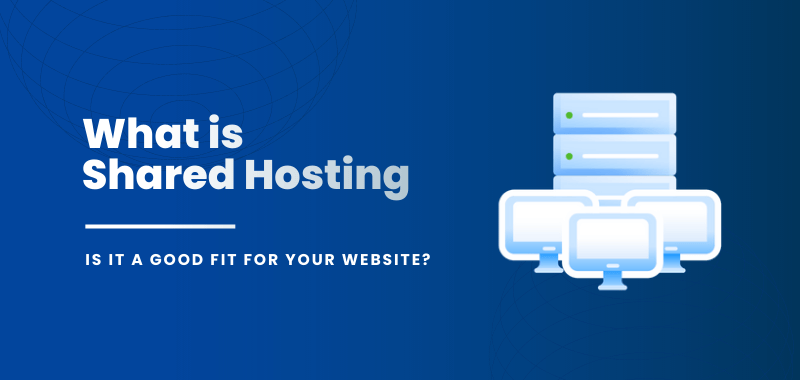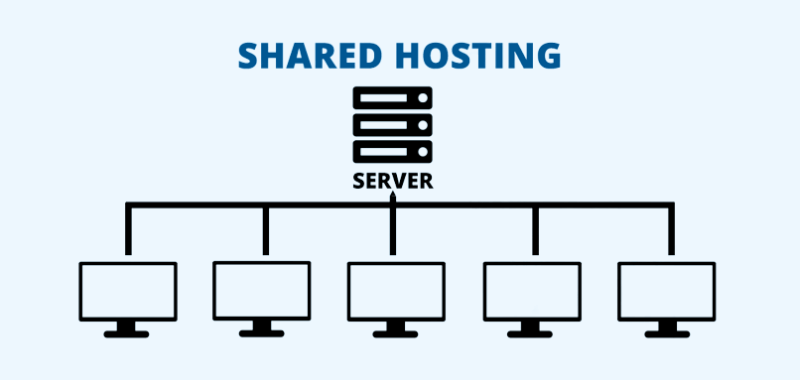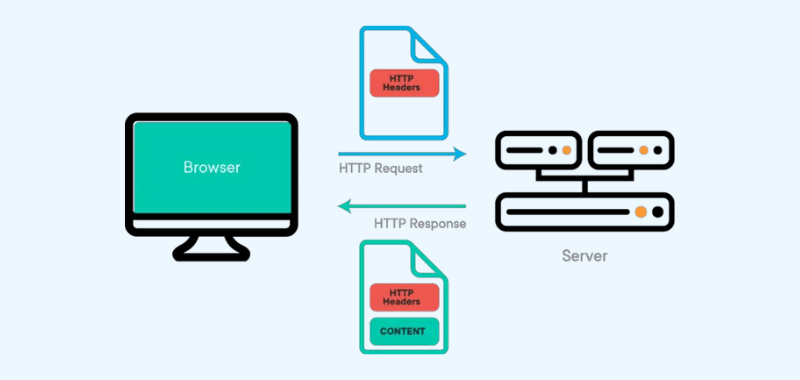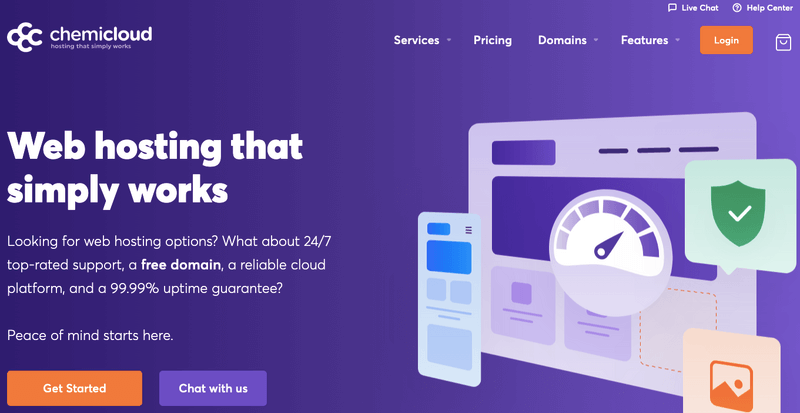Are you confused about “what is shared hosting“? Don’t worry, it’s easier than you think!
In 2024, having your website hosted is more important than ever, but for beginners launching their first website, it can also be a confusing and challenging task to tackle.
The success of your site and the well-being of your budget depend on your familiarity with the various hosting types and plans.
Hosting isn’t as difficult as it may seem at first glance, and here’s why: it’s all about breaking things down.
With some research, you can confidently select the ideal hosting package for your needs and those of your website.
This blog will cover everything about shared hosting including what is a shared hosting account, which is often used by new website owners in this modern age.
And we’ll go through a few things about if you’re trying to decide if shared hosting is a good fit for you. Let’s start.

Table of Contents

The clue to comprehending “what is shared hosting” is implicit in the name itself. While using this sort of hosting, your website will be stored on the same physical server as other websites.
Okay, now, let’s talk about how servers and hosting function. So, you can grasp what it means and why it’s significant.
Every webpage you visit is hosted on a server (a type of computer). This is how it is made available to the general public. The location of a website is determined by its address, which is what the user types into the browser.
The browser then sends a request to the server for site data. All of the information for a web page is delivered by the server and shown in the user’s browser.

After that, they can engage with the site in many ways, such as visiting different pages, clicking on links, submitting forms, etc.
Shared hosting allows multiple websites to share the resources of a single server and have their content and data made available to users.
This is in contrast to dedicated servers, which are used to host a single website.
Shared hosting plans are typically much more cost-effective than dedicated server plans due to the lower resource requirements of hosted websites.
The server’s upkeep falls under the purview of the host, saving you time and effort.
Sites can wind up effectively competing for resources, which is the major drawback.
Even yet, shared hosting plans are extremely common among newbies who are looking to host their first websites. This sort of hosting is appealing due to the low initial cost and the absence of regular maintenance needs.
Shared hosting typically has these characteristics:
- Shared hosting is one of the cheapest hosting alternatives because the server’s resources are split amongst numerous customers.
- Because the web host handles the server maintenance and security updates, shared hosting is simple to set up and administer.
- Because of the nature of shared hosting, resources such as storage space, transfer capacity, and processing power are all allocated on a restricted basis and shared across numerous websites.
- Most shared hosting plans include a control panel, such cPanel or Plesk, that simplifies the process of administering your website and your account.
- Firewalls and malware scanning are only two of the common security features offered by shared hosting providers that assist keep your website safe.
- Shared hosting companies typically feature a customer service department to assist you with any inquiries or problems you may have with your hosting plan or website.
- If your website expands and more resources are needed, you can typically upgrade to a more powerful plan or switch to a different hosting type with most shared hosting providers.
Considering all the available choices, picking a reliable shared hosting provider can be difficult. Check out these considerations before settling on a shared hosting plan:
The Stability of Servers: This includes the availability and speed of the hosting service. The former measures how quickly a server responds to a user’s request, while the latter measures the server’s overall availability.
Infrastructure: Verify that the hosting platform supports the CMS and PHP version that you intend to use on your website.
Server Space: All the website’s files, scripts, emails, and media are kept in the disk space. Choose a host that provides solid-state drive (SSD) storage for lightning-fast load times.
RAM: RAM stands for Random Access Memory, a storage medium for computer programs that allows for instant access. The more background processes you have, the more RAM you’ll need. You should figure out how much RAM your website type needs to run smoothly.
Bandwidth: The maximum quantity of data that may be transferred by the server in a given time period, expressed in megabytes per second. A site’s ability to handle heavy traffic increases in direct proportion to its available bandwidth.
Locations of Servers: To minimize network latency, pick a host whose shared servers are physically located near your intended audience.
Security: Important security features that a hosting service should include firewalls, virus scanning, DDoS protection, and automated backups.
Control Panel: Shared hosting packages allow site owners access to a graphical user interface (GUI) through the web. Hostinger’s hPanel is a graphical user interface (GUI) control panel, and it’s in good company with cPanel, Webmin, and Plesk.
Customer Support: A customer support representative can assist you in fixing any crashes or errors you may experience. So, it is essential to go with a shared hosting service that offers round-the-clock assistance. Live chat, telephone calls, and email tickets are frequently used methods of contact.
Technical Assistance Provided By Their Team: Management is included in almost all shared hosting plans. This is perfect for first-time users since it simplifies the installation and setup processes, making them much easier to complete.
Unmanaged hosting, on the other hand, comprises more advanced choices such as virtual private server (VPS) and dedicated server (DS) hosting.
They are fantastic for more sophisticated users that want more control over the way their website is developed and are looking for such a platform.
So, you’re thinking of setting up your website and looking for the right hosting option. Shared hosting could be the answer you’re looking for.
But who exactly can benefit from it? Let’s dive into it!
Individuals, Startups, And Small Businesses
If you’re just starting out, don’t have high website traffic, and are on a tight budget, shared hosting might be the perfect choice for you.
It’s a great option for individuals, startups, and small businesses that don’t require many features and resources.
Newbies
Are you a newbie to the world of web hosting? Well, shared hosting can be your best friend! With shared hosting, you don’t have to worry about server maintenance, security upgrades, or software installations.
The hosting provider will take care of all the technicalities, leaving you with more time to focus on your website’s content.
While shared hosting is a fantastic option for many, it may not be suitable for everyone.
Here are some reasons why shared hosting may not be the best fit for you.
Fast Or Complex Websites
If you have a website that has high traffic or is complicated, shared hosting may not provide the resources you need.
Due to sharing resources with other websites on the same server, your website may load slowly, or in some cases, even go offline.
In this case, dedicated hosting or VPS hosting might be a better option for you.
Advantages Of Shared Hosting

- Affordability: One of the most cost-effective hosting solutions is shared hosting. Having numerous websites share a single server reduces costs for everyone involved, making it a great option for startups and sole proprietors.
- Conveniently simple setup: The setup and maintenance of shared hosting are simple. Because the web host handles technical tasks like server upkeep and security upgrades, it’s a great alternative for those just getting started.
- Scalability: Whenever your website starts to outgrow the resources provided by your shared hosting plan, you can usually upgrade to a more robust plan or transfer to a different hosting type.
- Control Panel: A control panel, like cPanel or Plesk, is included in most shared hosting plans and simplifies the process of administering your website and your account.
- Technical Support: Technical assistance is available from your shared hosting provider to assist you with any inquiries or problems you may be experiencing with your hosting account or website.
Disadvantages Of Shared Hosting
- Limited resources available: Shared hosting limits storage, transmission, and processing power. One website using too many of these resources on a server may slow down all the websites housed there.
- Security: Multiple websites sharing a server increases the risk of a security compromise.
- Control: Sharing a server with other websites limits your control over its settings and setup. Installing new software or changing server settings is currently impossible.
- Unsatisfactory Results: Due to the nature of shared hosting, the performance of one website may be negatively impacted by the presence of other websites on the same server. A sudden spike in visitors to another site might have a negative impact on the performance of your own.
- No dedicated resources: With shared hosting, your website will share the server’s resources with other users. As these resources are being shared, the performance of your website may suffer.
Here are our top 5 picks when it comes to reliable shared web hosting companies which you can choose from without thinking twice.
1. Bluehost

In business since 2003, Bluehost is one of the most trusted names in the shared hosting space.
They include low-cost packages that include a
- Free domain name
- Unlimited disk space and
- Unmetered data transfer
Its straightforward design makes it simple even for inexperienced users to create and maintain their own websites.
In addition to a comprehensive knowledge library, Bluehost offers round-the-clock customer service by live chat, phone, and email.
RELATED POSTS
2. Hostinger
Due to its low costs and lightning-fast speeds, Hostinger has quickly become one of the most popular shared hosting platforms.
They include packages that include
- Unlimited bandwidth,
- A free domain name, and
- An SSL certificate at no extra cost.
With Hostinger, you can install popular content management systems like WordPress and Joomla with only a click of the mouse.
They provide a comprehensive knowledge library that includes lessons and a list of commonly asked questions, and their customer support staff is accessible through live chat and email at any time of the day or night.
RELATED POSTS
3. A2 Hosting

Shared hosting from A2 Hosting is dependable since their servers are always up and running at top speed. Plans include free SSL certification and unlimited storage, bandwidth, and email addresses.
With A2 Hosting’s intuitive control panel, you can quickly set up content management systems like WordPress and Drupal with a single click.
Along with offering live chat, phone, and email assistance around the clock, A2Hostings also provides an extensive knowledge base filled with lessons and answers to commonly asked problems faced by the concerned businesses.
4. HostArmada

HostArmada is a Cloud SSD shared hosting service that guarantees 99.99% uptime, lightning-fast page loads, and round-the-clock customer assistance. Even though it just came out in 2019, it has quickly become a popular web host because of its many useful features, adaptability, and simple connection.
HostArmada’s Cloud-based Services are reliable since they are built and supported using the latest hardware components that meet or exceed industry standards.
In addition, it uses KVM virtualization and Storage Replication redundancy to ensure that no downtime occurs.
5. ChemiCloud

ChemiCloud is an online platform that offers shared hosting services to its users.
To put it another way, it is a platform that enables several websites to share a single server and all of the resources the server has, such as storage space and bandwidth.
When website owners make use of the shared hosting services provided by ChemiCloud, they are able to enjoy hosting options that are both cost-effective and do not need them to operate their own servers.
ChemiCloud provides round-the-clock service to its clients in addition to providing a variety of shared hosting plans that are tailored to individual customers’ requirements and financial constraints.
RELATED POSTS
The price of a shared server might vary widely depending on the hosting company as well as the services that come standard with the hosting package.
Storage space, bandwidth, and the allowed number of hosted sites all contribute to the total cost of a shared hosting plan, which may be anything from a few dollars per year up to several hundred dollars.
Here are the costs of the shared hosting services we’ve discussed above;
| Web Host | Starting Price | Total Cost | Free Domain |
|---|---|---|---|
| Hostinger | $1.99/mo | $95.52 (48 Months) | No |
| Bluehost | $2.95/mo | $35.40 (12 Months) | Yes |
| A2 Hosting | $2.99/mo | $35.88 (12 Months) | No |
| HostArmada | $2.99/mo | $107.64 (36 Months) | Yes |
| ChemiCloud | $3.48/mo | $125.28 (36 Months) | Yes |
FAQs
Have a quick look at the most commonly asked questions about shared hosting that you find helpful.
Shared hosting refers to the practice of housing several clients’ websites on a single server. Hosted websites share the server’s resources, including its processing power, memory, and storage space.
Shared hosting is an economical option for small to medium-sized websites with modest traffic and storage demands. If your website receives a large volume of traffic or makes heavy use of server resources, a virtual private server (VPS) or dedicated server (DS) may be the ideal solution.
When many users share a server, the shared server cost is divided among them. In addition, several shared hosting firms provide 24/7 support for customers and simple interfaces for administering websites.
The nature of shared server space means that the performance of your site might be affected by the performance of other sites hosted on the same server. Disk space, data transfer, and database access may all have quotas with shared hosting.
You may generally upgrade to a VPS or dedicated server if your website outgrows its current shared hosting package. Get in touch with your hosting provider for details on potential upgrades and their related prices.
There are a lot of shared hosting examples in 2024. Hostinger, Bluehost, A2 Hosting, HostArmada, and ChecmiCloud are to name a few on the list of best web hosting providers.
Also Read:
- How to Start a Blog in 2024: A Step-by-Step Guide for Beginners
- Top 16 Blogging Mistakes To Avoid in 2024 (For Amateur Bloggers)
- Best Web Hosting Free Trial 2024 (No Credit Card Required)
- Managed Hosting vs Shared Hosting: Which is the Right Fit?
- Most Reliable Managed WordPress Hosting for Maximum Performance in 2024
- Top Reliable Web Hosts to Get Free .Com Domain for 1 Year in 2024
- Top Sites To Buy Expired Domains in 2024
Shared hosting is an ideal solution for individuals, startups, and small businesses looking to establish an online presence on a budget.
It’s a low-cost option because multiple websites share the same server. The added benefit is that you don’t need any technical knowledge to use shared hosting because the hosting provider will handle all server administration and maintenance.
However, keep in mind that you may face resource constraints with shared hosting that can slow down your website’s loading time or even make it unavailable during peak traffic periods.
Therefore, it’s crucial to consider the availability, transfer capacity, and other key features of your shared hosting plan.
And, if you need more resources, upgrading to a higher plan, or considering cloud hosting or a virtual private server (VPS) could be a smart choice.
So, weigh your options and choose a shared hosting plan that suits your website’s needs and growth potential.